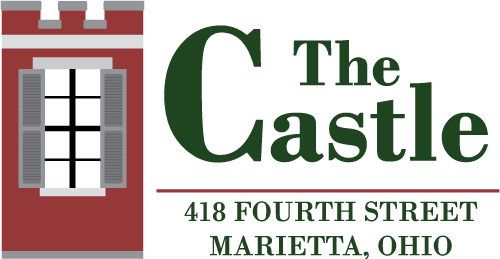(From The Marietta Times // by Janelle Patterson)
Not only did Marietta residents celebrate the 229th birthday of Ohio’s first settlement Friday, but many also gathered to commemorate the 100th anniversary of the United States’ entry into World War I.
Listening to both speakers and musical performances paying homage to the forgotten war, those in attendance learned of the influence of prejudice, the polarization of heritage and the moral push for loyalty at the sacrifice of genealogical history within the walls of the Peoples Bank Theatre Friday during the theater and The Castle’s joint presentation of “Lest We Forget.”
“Marietta’s role was rather indicative of small rural towns and their contribution to the war effort,”explained Marietta College Professor Matthew Young.
“But what’s unique about Marietta is there wasn’t the violent animosity towards German-Americans. Instead that population really pushed to prove their loyalty and cut ties with Germany.”
– Marietta College Professor Matthew Young
German heritage, unlike the many other origins often displayed proudly throughout the country, was buried decades after the war.
“They changed their names, they stopped having German services in churches in town in 1919, they wanted to be seen as loyal,” explained Young. “But now, anybody who’s from Marietta can trace back their families in some way to German ties. The first world war was seen as the opposite to the positive and clearly defined moral enemy in the second, which was seen as a unifying and positive war.”
The Great War was seen as the seminal tragedy of the 20th century because of its aftermath: the Great Depression, the sanctions on Germany leading to World War II and the simultaneous collapse of Eastern European empires, said Becki Trivison, Ohio History Connection’s program coordinator for local history and the World War I commemoration.
“But the Great War must also be viewed as a watershed for the modern world … and its legacies in the Middle East, with women’s rights and with immigration, so much has come out of this era that still affects our lives today,” Trivison explained.
The war polarized the nation in such a short time that no war since the Civil War had done, explained Wright State history professor Paul Lockhart.
“The war wouldn’t leave America alone, and to be seen as anything but loyal and against German tyranny was the moral equivalent of treason,” he said.
But the U.S. involvement in the war effort was so short that the first modern war is oft called the Forgotten War.
“In a matter of months Marietta College shut down and converted into a training center but by the time it did the war was over and they tried to start classes back up in the spring,” said Young. “World War I is different because the generation that fought it looked at it as a tragedy. They didn’t focus on their sacrifices and struggles, they wanted to get on with their lives and get back to normal. That generation is sometimes referred to as the forgotten or silent generation because of this.”
The college also saw animosity of its own when some of its students looked to create a volunteer ambulance service in France, rather than get drafted into combat.
“The president of the college at the time even called them cowards,” said Young. “He called them a disgrace, believing their families were pulling strings to get them out of honorable service.”
But the overarching impact of The Great War dictated not only how modern wars are fought, but how the nation answers the call to bear arms in protection not only of its sovereign lands, but of the peace and freedom of the nation.
“We won’t come back ’til it’s over, over there,” sang the musician Barefoot McCoy on Friday, as he performed “Over There,” a 1917 patriotic song written by George M. Cohan designed to inspire American young men to enlist in the army during the Great War.

